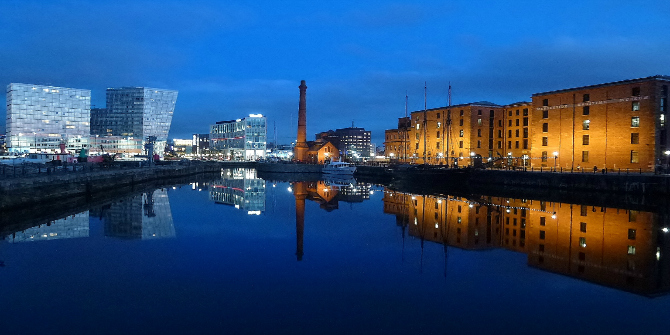 A torrent of ‘expert’ commentary has evaluated positively the chances of a Boris Johnson government adopting new, ‘one nation’ policies to give priority to the interests of working class voters and ‘left behind’ communities in northern or midland Britain. Patrick Dunleavy enumerates the numerous countervailing reasons to expect instead that this government will be very similar to its Conservative predecessors in maintaining the inegalitarian domestic policies of recent times.
A torrent of ‘expert’ commentary has evaluated positively the chances of a Boris Johnson government adopting new, ‘one nation’ policies to give priority to the interests of working class voters and ‘left behind’ communities in northern or midland Britain. Patrick Dunleavy enumerates the numerous countervailing reasons to expect instead that this government will be very similar to its Conservative predecessors in maintaining the inegalitarian domestic policies of recent times.
The UK’s national media and the ‘commentariate’ have strong interests in talking up the prospects of a Boris Johnson government as marking a new direction in British politics. To predict just ‘more of the same’ sells fewer newspapers. So it is little wonder that the Conservative papers have maxed out on delineating the imagined policy details of a ‘shining path’ to a golden future that Johnson’s administration will herald.
Yet quite a few left-leaning, non-aligned and academic voices have also found it plausible that a Johnson government will assign much greater policy weight to rebuilding the depressed parts of northern and midlands England – so as to cement and retain for the long-term the possibly temporary support of erstwhile ‘red belt’ voters there. The argument goes that all the 47 MPs in seats gained this time around, and many more previously marginal Tory incumbents, owe their Commons position to Johnson’s populist ability to reach audiences previously hostile to the Conservatives’ message. This was the PM’s personal victory, achieved in the face of net dissatisfaction levels with the government of -55%.
The new cohorts of MPs will allegedly be a powerful lobby for the interests of their previously neglected communities, their voice chiming powerfully with the PM’s own instincts towards a more interventionist ‘one nation’ Toryism, which he displayed as London mayor and reiterated in the election campaign. The policy consequences supposed to follow range from concluding a ‘softer’ Brexit deal more favourable to manufacturing interests (in the process ‘seeing off’ the hard-right irreconcilables of the European Research Group), to a new and innovative regional policy impetus, and a ‘softer’ line on public services and welfare funding issues.
Enchanting though such visions of a more generous Conservatism and a more egalitarian Britain may be, there are many good reasons why they are unlikely to happen – some structural, and others political.
Structural barriers
The UK’s economic, institutional, and cultural systems impose eight major constraints that make for only a limited scope of government action, making a mockery of Dominic Cummings’ allegedly ‘revolutionary’ policy change ambitions.
- Brexit’s depressing economic impacts may not yet have become visible to most voters, but in business and academia they are already clearly at work, incrementally eroding the UK’s GDP, our attraction for foreign direct investment, the scope for future economic growth, and the healthiness of the government’s tax base.
- The triple lock on taxes in the Tory manifesto means that no income tax, National Insurance or VAT increases can be envisaged for the next Parliament. The corporation tax decrease once proposed has accordingly been scrapped (for now). The government might yet deliver some progress on its promise to make the FAANG US platform companies pay some alternative to corporation tax (evening up competition for Britain-only businesses). But this won’t happen with any kind of US trade deal. Allied with post-Brexit stagnation influences, tax stasis will mean continuing pressure on government budgets, especially grants to regions and localities.
- Completely deadweight subsidies to agriculture and fisheries will transfer to the UK after Brexit. Tory ministers have already pledged steady-state funding to 2025 and will be under immense pressure from both organized lobbies and their personal contact circles and land-owning interests to accede to increased payments that they know serve no purpose economically.
- Replacing EU support for R&D will be very difficult, let alone finding new monies, since the UK typically gained far more funding than its population share in many high tech areas of forefront research. The loss of scale, expertise, and collaboration avenues in projects, and shifting decision-making back to Whitehall from the greater professionalism of EU evaluations, will both have negative effects. The lacklustre history of UK industrial policy shows that single-country decisionmakers are particularly likely to buy into a disastrous ‘techno-nationalism’ that typically ends not with a bang but a whimper. Bringing in business ‘experts’ from the UK’s depleted (and largely defeatist) manufacturing base (as Cummings proposes) will make things worse, as it already has in universities (themselves arguably some of the UK’s strongest economic actors now).
- Most previous ‘industrial’ strategies (and all of Cummings’ scientistic fantasies of future growth) ignore the plain fact that the UK is 80% a service economy now. So even if a manufacturing revival was achievable, it is largely irrelevant to jobs and the health of the largest economic sectors. Services follow consumers, and so won’t resist the pull of the dominant south east and London. The exodus of brightest and most entrepreneurial people from the UK’s more peripheral regions is not yet on a Latvian scale (which has lost 23% of its population since 1990). But the effects on educational morale and entrepreneurial and civic culture are poor.
- In dozens of Midlands and northern towns the three largest local employers are state organizations – the NHS general hospital, the local authority, and the university. Often they are the only local centres of expertise on how to manage large organizations in a sea of small firms with limited capital and time horizons, and a welter of own-account workers. Yet Tory ministers and MPs have long ignored or denigrated public sector managers, convinced they have nothing to contribute to local business or organizational flourishing.
- Amazon (and other digital suppliers) will carry on eating high street businesses and those dependent on footfall unless the government takes drastic action to rebalance taxes on or regulation of their current operations. Ministers may try to combat the hollowing out of most depressed town centres by freeing up planning restriction on former commercial properties. But that normally just extends residential areas and fosters more town-cramming by local authorities – it does nothing to diversify or strengthen the employment base.
- The new government has few significant regional or place-based policies to draw on – there is no ‘magic pot’ of proven strategies that have not already been tried. And Conservative ministers are often hostile to those strategies that have the best records of working – such as public sector-lead redevelopment, growing ‘cultural districts’ to energize cities, or allowing local areas to carve out their own distinctive paths growing different ‘industrial districts’ with agglomeration economies – always anathema also to Whitehall.
Political reasons favouring standard Tory policies
Imagine, for a moment, that we lived in a well-funded and well-founded British state, with a thriving economy and tax base. There are still numerous political reasons for scepticism about whether a Tory government could even then implement from Whitehall the ‘one nation’ policies being so eagerly trailed.
- The new Conservative MPs will have little political clout compared with the established hierarchies of the Tory party and parliamentary group. Unversed in the byzantine ways of Erskine May, they will have to spend their first two years just learning their way around Westminster. And as ‘marginal’ MPs, their Commons careers are likely to be short, and their influence on policymaking slender – since they will have to assign much of their time to ‘nursing’ their constituency position. If it later looks unlikely that they will retain their seats, the ‘realpolitik’ of Tory power politics will cut their influence further. Their temporary voices could easily be discounted to zero if they are foreseeably on the way out of politics anyway.
- Johnson has little freedom of manoeuvre right now to reorganize his current Cabinet of Brexit ‘extremists’. Leaks suggest that he will make a few instant changes to last until the 31 January date for UK ‘exit’. Then in February 2020 he will proclaim ‘Mission Accomplished’ and scrap the (hopeless) Department for Exiting the EU (moving most powers into the Cabinet Office, where they should have been all along). According to the Sunday Times, he may also merge the Department for International Development into the Foreign Office (although this failed to work before). And he may absorb the (also provenly hopeless) Department for International Trade into the Department of Business. Perhaps the immigration function may be taken away from the (dysfunctional) Home Office and given to a new single-focus ministry. In all these plans, notice that the dominant orientation is outward, to the trading world where the UK will desperately need new markets to replace the Brexit-induced losses, not inwards to equalizing UK life conditions.
- A far right-wing agenda is still live amongst Conservative elites. The thinking behind the 2012 Britannia Unchained intra-party manifesto is alive and well, and most of the current Cabinet are firm adherents to radical anti-statist thinking. From mid-February onwards, secure in their positions, those Cabinet ministers who can survive in their chairs will be barons within their own departments – free to pursue their agendas beneath the limited radar of Number 10. With the erstwhile Remainers in the Conservative ranks either expelled by Johnson’s pre-election gambits, or caught up in the ‘spiral of silence’ that has completely side-lined liberal Tory voices, the right’s task in stiffening pro-privatization policies has never been easier. They may also draw on substantial support amongst the new wave of Tory MPs themselves, many of whom have been radicalized into simplistic ideological views by their long toil against the odds in their localities.
- All the Tory factions have especially set their face against ‘entrepreneurial state’ solutions, so it will be hard to induce them to recognize the need for constructive public development (and ownership) of infrastructures, or state sponsorship of pre-collaborative research relevant to the UK’s services economy (rather than some industrial/scientistic renaissance that will never happen).
- The civil service will be distracted by urgent and difficult Brexit implementation work. By April 2020 there will be 27,000 civil servants doing nothing else but working on Brexit-related changes to administrative and IT systems. In autumn 2019, Operation Yellowhammer (getting ready for Johnson’s and Cummings’ aborted ‘hard Brexit’) wasted millions of pounds on measures that were never implemented, drawing in thousands of civil servants from across the department spectrum (and across the globe). Add that waste to the three years of policy stasis that Brexit has already caused and the post-austerity UK state is uniquely fragile and unable to assure basic functions – as the chronic Whitehall inaction underlying the 2017 Grenfell Tower catastrophe vividly illustrated.
- Most British premiers become fascinated by striding the world stage, as Tony Blair did to the destruction of his own governments. In the right-wing dining clubs and think tanks of London there are still numerous Tory ministers and MPs obsessed with ‘projecting power’ overseas – hence the two UK aircraft carriers (with almost none of the essential protective destroyers) that Cummings so detests. Since the UK can actually do nothing alone internationally, a lot rests on US decisionmaking. So far, Trump has avoided most overseas adventures (apart from re-sending troops to Saudi Arabia, despite the adverse consequences last time this was tried). But it is likely only a matter of time before some new involvement (beyond the current Syria roles) is engineered by an MoD hierarchy anxious to restart big league spending. Will Johnson want to focus hard on mundane domestic issues, resisting the siren voices to maximize the UK’s ‘weight in the world’, either alongside the USA or perhaps the French?
- Johnson will be less prominent on the world stage than any PM in recent decades. All the European Council meetings will be excised from his calendar at a stroke, and he will be Canadian-level spare wheel at G7 or G20 meetings, reduced to hustling in the corridors for trade deals and touring regions where UK trade is inherently limited by geographical distance. His temptation to counteract the UK’s marginalization by some dramatic (early Churchillian style) adventure will be strong.
- The government’s term will last six to eighteen months less than five years. Because the election happened in December, Johnson has actually only got a maximum of four and a half years in power – until May/June 2024. But delaying an election that long risks boxing the government in to potentially holding it when its popularity has drained down. By 2022 at the latest, the PM will have regained control of election timing, as Nick Clegg’s fixed-term elections law is finally scrapped. So, just as most governments previously lasted only four years within the notional five-year term, so there will be strong pressures on the PM to avoid risking a ‘lame duck’ final year by going back to voters after only three and a half years – in May/June 2023.
Supposing some regional policy initiatives have actually happened, they will barely have started to work by then. Probably even the NHS pledge will not yet have produced noticeably beneficial results. So the incentives for the government will instead be to prioritize ‘easy win’ progress on ‘buzz’ issues for solidifying their core support – by cracking down on immigration, locking up criminals for longer, fixing a few million potholes in roads, and flying the flag on some allegedly ‘low risk’ military adventure overseas. The Johnson government is thus overwhelmingly likely to resemble its Tory predecessors.
_________________
 Patrick Dunleavy (@PJDunleavy) is Professor of Political Science and Public Policy in the Government Department at LSE, and Centenary Professor at the Institute for Governance and Policy Analysis at the University of Canberra. His most recent books are The UK’s Changing Democracy (LSE Press, 2018) [co-edited], which is free to download; The Impact of the Social Sciences (Sage, 2014) [co-authored]; and Growing the Productivity of Government Services (Elgar, 2013) [co-authored].
Patrick Dunleavy (@PJDunleavy) is Professor of Political Science and Public Policy in the Government Department at LSE, and Centenary Professor at the Institute for Governance and Policy Analysis at the University of Canberra. His most recent books are The UK’s Changing Democracy (LSE Press, 2018) [co-edited], which is free to download; The Impact of the Social Sciences (Sage, 2014) [co-authored]; and Growing the Productivity of Government Services (Elgar, 2013) [co-authored].
All articles posted on this blog give the views of the author(s), and not the position of LSE British Politics and Policy, nor of the London School of Economics and Political Science. Featured image credit: Pixabay (Public Domain).







